Finland is fortifying against neighboring Russia
Finland's government is expected to authorize its Border Guard to construct new fencing along over 150 miles of its 800-mile border with Russia.
On a rainy day in Helsinki, the Finnish army is building a bunker.
As Finland continues its bid to join NATO — and as the Ukraine war drags on — the country has been further fortifying its border with Russia.
There’s growing fear of retaliation from Moscow.
Major Petteri Viitanen is supervising this operation.
“We are constructing readiness constructions, little fortifications where we practice the whole chain – how do we build these things from the beginning to the actual construction. (FLASH) This is, if I use the word, really strong. It lasts a direct hit from artillery or a nearby hit from missiles or such. So it lasts tens of kilos of explosives. They are really robust.”
This isn’t just about fears of a military incursion though.
Finland’s NATO bid has caused it to fear that retaliation could come in the form of Russia sending a flood of migrants to the border — with the goal of destabilizing the country — similar to the crisis on the border between Poland and Belarus last year.
In the coming months, Finland’s government is expected to authorize its Border Guard to construct new fencing along over 150 miles of its 800-mile border with Russia.
They expect it will take three or four years to complete.
But as of now, Finland’s ascension to NATO isn’t set in stone.
It continues to negotiate with the Turkish government, a NATO member which has objected to both Finland and Sweden joining on the claim that the Nordic countries support groups that Turkey considers terrorists.
This article has been fact-checked by Arctic Today and Polar Research and Policy Initiative, with the support of the EMIF managed by the Calouste Gulbenkian Foundation.
Disclaimer: The sole responsibility for any content supported by the European Media and Information Fund lies with the author(s) and it may not necessarily reflect the positions of the EMIF and the Fund Partners, the Calouste Gulbenkian Foundation and the European University Institute.
